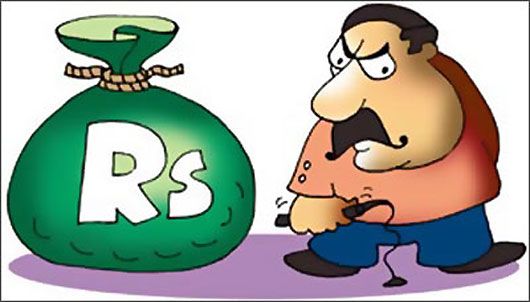With a staff crunch, it seems the I-T department would now target only the big fish rather than go after small assessees.
Dilasha Seth and PTI report.
Illustration: Uttam Ghosh/Rediff.com

Hobbling with a paucity of staff, the income tax (I-T) department might find it difficult to assess more than 600,000 to 700,000 cases a year, though the government has suggested that people depositing a minimum of Rs 2.5 lakh (Rs 250,000) cash in their bank accounts during the ongoing demonetisation drive will come under scrutiny.
On Sunday, November 20, the I-T department warned people against depositing their unaccounted old currency in someone else's bank account.
The tax department said it had decided to slap charges under the newly enforced Benami Transactions Act against violators that carries a penalty, prosecution and rigorous jail term of a maximum seven years.
The demonetisation drive started on November 8, with Prime Minister Narendra Modi announcing that the old series Rs 500 and Rs 1,000 currency notes would be illegal from the next day.
Those who possess money in these denominations can get it changed for legal tender from their banks till December 31.
However, those depositing Rs 2.5 lakh or more in the old currency would come under the scanner of the I-T department, the government has claimed.
With a staff crunch, it seems the department would now target only the big fish rather than go after small assessees.
This 600,000 TO 700,000 cases represent only 1% of the total I-T assessees in the country and 0.2% of total PAN card holders.
Most tax officials Business Standard spoke to confirmed the manpower crunch will compel the department to prosecute or penalise misreporting of large amounts (in crore).
"Given the current manpower of the department, we will be able to focus only on high-potential big-ticket cases and not the small ones. The scrutiny over deposits of Rs 2.5 lakh or more being talked about is keeping in mind that the amount is the basic tax-exemption limit," said an official.
The exception to this, he added, could be if a big racket comes to light with a businessman depositing Rs 2.5 lakh in 50 accounts or so.
In those cases, deposits of even up to Rs 2.5 lakh crore and Jan-Dhan accounts above Rs 50,000 could be investigated.
According to the sanctioned strength of the I-T department, there are 7,294 assessment officers up to the additional commissioner level, which includes 4,204 I-T officers.
The additional commissioners and joint commissioners handle about 30 to 40 quality cases a year, while the I-T officers assess about 100 to 150 cases a year, but smaller ones.
Tax officials pointed out the increase in volume of cases could impact the quality of assessment.
"Our situation will be like that of the bankers at the moment. There may be an increase in volumes of assessments as the investigation teams are making enquiries at full swing. But these additional cases arising out of demonetisation could add to the existing backlog and only reduce the quality of assessment," said another official.
The I-T department has issued hundreds of notices to individuals and firms, seeking sources of funds from those who have deposited large amounts in banks using the Rs 500 and Rs 1,000 currency notes since the demonetisation drive began.
"These are just enquiries being carried out by the investigative wing. They will gather information and ultimately give it to the assessment officers for action. These assessment officers are limited in number," said another official.
The move is aimed to check tax evasion, money laundering and black money circulation.
But many tax officials claim it may not be difficult to explain the source of funds in case of bank deposits, since the third quarter (October to December) is the peak demand season.
"Most festivals and marriages take place during the third quarter. It will not be difficult to explain the large deposit," he said.
It would be a challenge, he added, for the tax officer to prove that depositors misreported income the previous year.
"Enough evidence will have to be gathered for that. The onus will be on the tax department to prove that depositors misreported."











